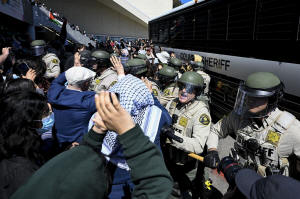Private groups work to identify and report student protesters for
possible deportation
[March 29, 2025]
By ADAM GELLER
NEW YORK (AP) — When a protester was caught on video in January at a New
York rally against Israel, only her eyes were visible between a mask and
headscarf. But days later, photos of her entire face, along with her
name and employer, were circulated online.
“Months of them hiding their faces went down the drain!” a fledgling
technology company boasted in a social media post, claiming its
facial-recognition tool had identified the woman despite the coverings.
She was anything but a lone target. The same software was also used to
review images taken during months of pro-Palestinian marches at U.S.
colleges. A right-wing Jewish group said some people identified with the
tool were on a list of names it submitted to President Donald Trump's
administration, urging that they be deported in accordance with his call
for the expulsion of foreign students who participated in “pro-jihadist”
protests.
Other pro-Israel groups have enlisted help from supporters on campuses,
urging them to report foreign students who participated in protests
against the war in Gaza to the Immigration and Customs Enforcement
Agency.
The push to identify masked protesters using facial recognition and turn
them in is blurring the line between public law enforcement and private
groups. And the efforts have stirred anxiety among foreign students
worried that activism could jeopardize their legal status.
“It’s a very concerning practice. We don’t know who these individuals
are or what they’re doing with this information,” said Abed Ayoub,
national executive director of the American-Arab Anti-Discrimination
Committee. “Essentially the administration is outsourcing surveillance.”
It’s unclear whether names from outside groups have reached top
government officials. But concern about the pursuit of activists has
risen since the March 8 arrest of Mahmoud Khalil, a Columbia University
graduate student of Palestinian descent who helped lead demonstrations
against Israel’s conduct of the war.
Immigration officers also detained a Tufts University student from
Turkey outside Boston this week, and Trump and other officials have said
that more arrests of international students are coming.

“Now they're using tools of the state to actually go after people,” said
a Columbia graduate student from South Asia who has been active in
protests and spoke on condition of anonymity because of concerns about
losing her visa. “We suddenly feel like we're being forced to think
about our survival.”
Uncertainty about the consequences
Ayoub said he is concerned, in part, that groups bent on exposing
pro-Palestinian activists will make mistakes and single out students who
did nothing wrong.
Some groups pushing for deportations say their focus is on students
whose actions go beyond marching in protests, to those taking over
campus buildings and inciting violence against Jewish students.
“If you're here, right, on a student visa causing civil unrest ...
assaulting people on the streets, chanting for people's death, why the
heck did you come to this country?” said Eliyahu Hawila, a software
engineer who built the tool designed to identify masked protesters and
outed the woman at the January rally.
He has forwarded protesters’ names to groups pressing for them to be
deported, disciplined, fired or otherwise punished.
“If we want to argue that this is freedom of speech and they can say it,
fine, they can say it,” Hawila said. “But that doesn’t mean that you
will escape the consequences of society after you say it.”
Pro-Israel groups that circulated the protester's photo claim that she
was soon fired by her employer. An employee who answered the phone at
the company confirmed that the woman had not worked there since early
this year. In a brief phone conversation, the protester, who has not
been charged with any wrongdoing, declined to comment on the advice of
an attorney.
Calls to report students to the government
The unearthing and spreading of personal information to harass opponents
has become commonplace in the uproar over the war in Gaza. The practice,
known as doxing, has been used to expose both activists in the U.S. and
Israeli soldiers who recorded video of themselves on the battlefield.
But the use of facial-recognition technology by private groups enters
territory previously reserved largely for law enforcement, said attorney
Sejal Zota, who represents a group of California activists in a lawsuit
against facial recognition company ClearviewAI.
“We’re focused on government use of facial recognition because that’s
who we think of as traditionally tracking and monitoring dissent,” Zota
said. But “there are now all of these groups who are sort of complicit
in that effort.”
The calls to report protesters to immigration authorities have raised
the stakes.
“Please tell everyone you know who is at a university to file complaints
about foreign students and faculty who support Hamas,” Elizabeth Rand,
president of a group called Mothers Against Campus Antisemitism, said in
a Jan. 21 post to more than 60,000 followers on Facebook. It included a
link to an ICE tip line.
Rand’s post was one of several publicized by New York University’s
chapter of the American Association of University Professors. Rand did
not respond to messages seeking comment. NYU has dismissed criticism
that she had any influence with its administrators.

In early February, messages from a different group were posted in an
online chat group frequented by Israelis living in New York.
“Do you know students at Columbia or any other university who are here
on a study visa and participated in demonstrations against Israel?” one
message said in Hebrew. “If so, now is our time!”
An accompanying message in English by the group End Jew Hatred included
a link to the ICE hotline. The group did not respond to requests for
comment.
Facial recognition looms over protests
Weeks before Khalil’s arrest, a spokesman for right-wing Jewish group
Betar said the activist topped a list of foreign students and faculty
from nine universities it submitted to officials, including
then-incoming Secretary of State Marco Rubio, who made the decision to
revoke Khalil’s visa.
Rubio was asked this week how the names of students targeted for visa
revocation were reaching his desk and whether colleges or outside groups
were providing information. He declined to answer.
“We’re not going to talk about the process by which we’re identifying it
because obviously we’re looking for more people,” he told reporters late
Thursday during the return flight from a diplomatic trip to Suriname.
[to top of second column]
|

Police push Pro-Palestinian protesters away from a bus carrying
arrested protesters at UC San Diego, May 6, 2024, in San Diego. (AP
Photo/Denis Poroy, File)

In a one-sentence statement, the Department of Homeland Security,
which includes ICE, said the immigration agency is not “working
with” Betar, nor has it received any hotline tips from the group.
But DHS declined to answer specific questions from The Associated
Press about how it was treating reports from outside groups or the
usage of facial recognition.
Betar spokesman Daniel Levy said that some people on its list were
identified using the facial-recognition tool called NesherAI created
by Hawila's company, Stellar Technologies, which was launched from
his Brooklyn apartment. The software takes its name from the Hebrew
word for “eagle.”
Demonstrating the software for a reporter recently, Hawila paused
repeatedly to tweak computer code to account for what he said was
the just-completed ingestion of thousands of additional photos
scraped from social media accounts.
After some delay, the software matched a screenshot of a fully
masked protester — seen on video confronting Hawila at a recent
march — with publicity photos of a woman who described herself
online as a New York artist. He said he would report her to the
police for assault.
Hawila, a native of Lebanon, is no stranger to controversy. He was
the subject of news stories in 2021 when, after marrying an
ultra-orthodox woman in New York, he was confronted with accusations
that he lied about being Jewish. Religious authorities have since
confirmed that his mother was Jewish and certified his faith, he
said.
Hawila said he no longer works directly with Betar but continues to
share protesters’ names with it and other pro-Israel groups and said
he has discussed licensing his software to some of them. He showed
an email exchange with one group that appeared to confirm such
contact.
“Technology, when used in good ways, makes the world a better
place,” he said.
Trump promised to crack down during campaign
As a candidate, Trump campaigned on a promise to crack down on
campus antisemitism and threatened to deport activists with student
visas that he called violent radicals.
Soon after the election, Betar claimed on social media that it was
working to identify and report international student protesters to
the incoming administration.
“Entire university departments have been corrupted by jihadis,” Levy
said in a recent e-mail exchange with the AP.
Days before his arrest, Khalil said in an interview that he was
aware of Betar’s call for his deportation and that it and other
groups were trying to use him as a “scapegoat.”
Students protesting Israel's conduct in Gaza have been unsure what
to make of Betar, which the Anti-Defamation League recently added to
its list of extremist groups. The ADL has also voiced support for
revoking the visas of foreign student activists.
At the University of Pittsburgh, leaders of Students for Justice in
Palestine said they spoke with police in November after an online
message from Betar that said it would be visiting the school to
“give you beepers” — an apparent reference to Israel’s detonation of
thousands of electronic pagers last fall to kill and wound members
of Lebanon’s Hezbollah militia.
Ross Glick, who was Betar's executive director at the time, said
that the message was “a tongue-in-cheek dark joke,” not a threat.
Both sides said police eventually decided no action was warranted.
Months later, Betar said that Pitt students were among those on its
deportation list.
Students dependent on visas fear being targeted
The efforts to target protesters have fueled anxiety among
international students involved in campus activism.
“They’ve abducted someone on our campus, and that is a key source of
our fear,” said the Columbia student from South Asia.

She recounted cancelling spring break plans to travel to Canada,
where her husband lives, for fear she would not be allowed to
reenter the U.S. She has also shut down her social media accounts to
avoid drawing attention to pro-Palestinian posts.
And, because her apartment is off campus, she said she offered
accommodation to other international students who live in university
housing and are wary of visits by immigration officers.
Leaders of Students for Justice in Palestine chapters at George
Washington University and Pittsburgh said some international
students have asked to have their email addresses and names removed
from membership lists to avoid scrutiny.
A Columbia graduate student from the United Kingdom said that when
he joined a pro-Palestinian encampment last year, he never
considered whether it might affect his immigration status.
Now he’s rethinking an incident in October, when someone scattered
fliers in a campus lounge celebrating the 2023 Hamas attack on
Israel that sparked the war. A classmate who supports Israel accused
him and others in the room of being responsible for the fliers and
snapped their photos, according to the student, who said he had
nothing to do with the material distributed.
“My main worry … is that he shared those photos and identified us
and shared it with a larger group of people,” the student said.
Other students have been dismayed by an atmosphere that encourages
students to inform on their classmates.
“It really bothered me because this cultivates this environment of
reporting on each other. It kind of gives memories of dictatorship
and autocratic regimes,” said Sahar Bostock, who was among a group
of Israeli students at Columbia who wrote an open letter criticizing
efforts to report pro-Palestinian protesters.
“I had to say, ‘Do you think this is right?’”
___
Associated Press reporters Jake Offenhartz and Noreen Nasir in New
York and Matthew Lee in Miami contributed to this report.
All contents © copyright 2025 Associated Press. All rights reserved
 |